DCPA NEWS CENTER
Enjoy the best stories and perspectives from the theatre world today.
Enjoy the best stories and perspectives from the theatre world today.
This article was published on February 9, 2019
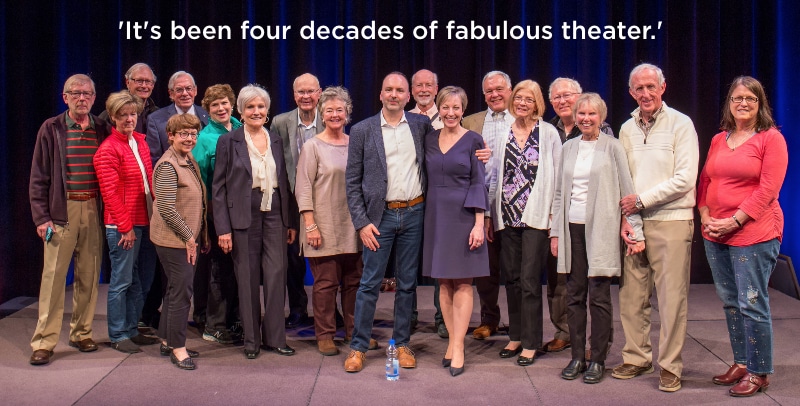
Some of the DCPA Theatre Company’s charter subscribers joined CEO Janice Sinden and incoming Artistic Director Chris Coleman before the start of the 40th season. Photo by Adams VisCom.
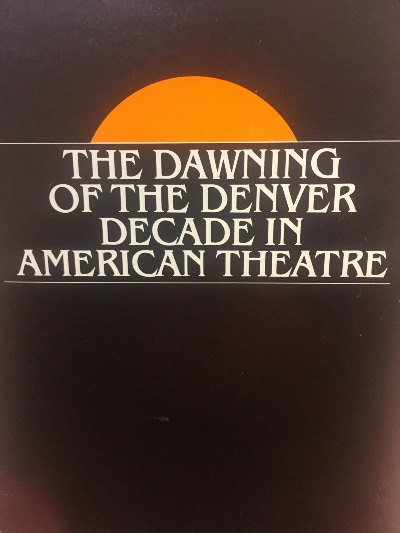 The DCPA Theatre Company officially launched on the final day of the 1970s, and for one specific and strategic reason: The opening of the largest new professional regional theatre between Chicago and L.A. on December 31, 1979, would mark what was billed as “The Dawning of the Denver Decade in American Theatre.”
The DCPA Theatre Company officially launched on the final day of the 1970s, and for one specific and strategic reason: The opening of the largest new professional regional theatre between Chicago and L.A. on December 31, 1979, would mark what was billed as “The Dawning of the Denver Decade in American Theatre.”
That Denver was creating a company that would rival thriving organizations in Seattle, San Francisco, Los Angeles and Minneapolis came as a surprise to many. Denver was thought by many to be a cultural cowtown, and with good reason: The city had more newspapers than theatre companies in 1979.
“But if Denver was a cowtown, then the DCPA Theatre Company made Denver a world-class cowtown,” said Bob Janowski, one of several dozen original and ongoing subscribers who signed up sight unseen for whatever the Denver Center was offering in 1979.
They bought in for different reasons. “We were excited that a repertory company was coming to Denver, and we wanted to be a part of it,” said Arlene Galchinsky of Englewood. Phil Nash of Denver found being part of something from the very start to be an attractive notion. Walt Colligan bought a subscription for wife Nancy as an anniversary gift. “And we’ve been going ever since,” she said. Becky Andrews of Florence, an expectant mother at the time living more than 100 miles south of Denver, needed motivation: “Being pregnant, I was afraid we’d never go anywhere again if I didn’t make plans to get out of the house,” she joked.
The DCPA NewsCenter attempted to contact as many charter subscribers as possible in advance of the Theatre Company’s milestone 40th season. As you might imagine, some of them remember it like it was yesterday. And others, well … like it was 40 years ago. When asked for memories of the opening gala on December 31, 1979, one subscriber joked: “You’re stretching it to think I can get my mind back there from here.”
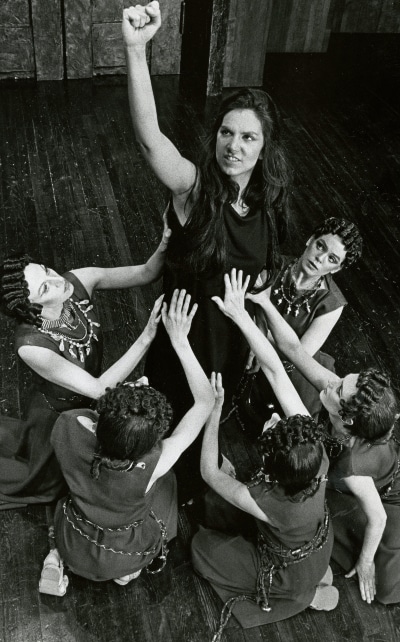
Future film and Broadway star Mercedes Ruehl in Medea, 1980.
They do remember seminal performances in the early years from rising young company members such as Tyne Daly’s The Caucasian Chalk Circle and Mercedes Ruehl’s breathtaking turn as Medea. “Perhaps the most riveting moment I remember from all 40 years was Mercedes Ruehl in the climactic scene of Medea,” said Nash. “It shook me up.” Ruehl would go on to win the 1991 Tony Award for Lost in Yonkers and the 1992 Academy Award for The Fisher King.
But when asked, say, what a subscription might have cost in that first season of five plays in the new Stage and Space Theatres, few of our respondents would even hazard a guess. Those who did figured they probably paid around $200 for the privilege.
But would you believe it: A full season subscription to that first season cost as little as $10. That’s right, just $2 per play. Subscription prices back then were based on what night of the week you attended. The Wednesday night package, for example, ran $30. The most expensive combo was $60 for Saturday nights. Prices were not based on where you sat, because you could pretty much sit anywhere you wanted.
That’s because it wasn’t exactly easy to attract an audience to come downtown to see German expressionism and French farce. Christopher H. Merrell of Denver, who attended that first season as a teenager along with his parents, remembers audiences in the early years being “how shall I say … on the sparse side?” he said. “I remember oftentimes my mom and me clapping with great enthusiasm because we wanted the actors to know they were appreciated.”
For that first season, subscription packages went on sale before the play titles were even announced to the public. For the record, that slate turned out to be:
“The Denver Center wanted us to subscribe without any knowledge of the play titles,” Merrell remembers. “We were simply promised a diverse selection of classical, musical and Shakespeare. We decided to journey along for the ride because we thought the season would give us a broad introduction to American and world theatre.”
Although the Denver Performing Arts Complex is now considered the cultural jewel of downtown Denver, it is located in what was then considered to be a seedy part of town, so courting loyal audiences would prove to be a massive challenge that was complicated by an oil bust.
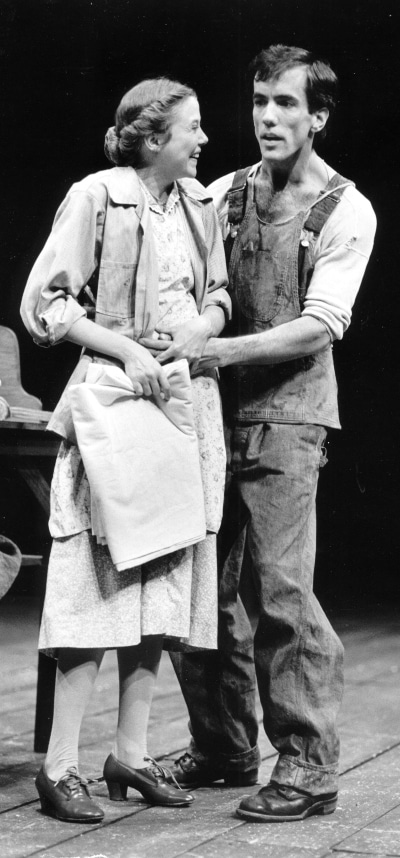
Annette Bening with John Hutton in ‘Christmas Miracles,’ 1985.
“The Denver economy was much more depressed then, and the city was really struggling to make its way,” said Annette Bening, who got her professional start with the Colorado Shakespeare Festival in 1980 and later starred in Denver Center productions of Pygmalion, The Cherry Orchard and Christmas Miracles during the 1985-86 season. “But even then the theatre was incredibly well-run, well-organized and well-funded, and shows were always handsomely mounted.”
In those days, a core group of resident actors was hired for entire seasons. And over the years, those original subscribers developed fierce and loyal relationships with them that in some cases lasted for decades. Founder Donald R. Seawell’s vision and their loyalty were rewarded less than two decades later, when the DCPA Theatre Company won the Tony Award as the best regional theatre in the nation.
What those charter subscribers remember most fondly today is what one simply called “four decades of fabulous theatre.” They cite, among dozens of other favorites …
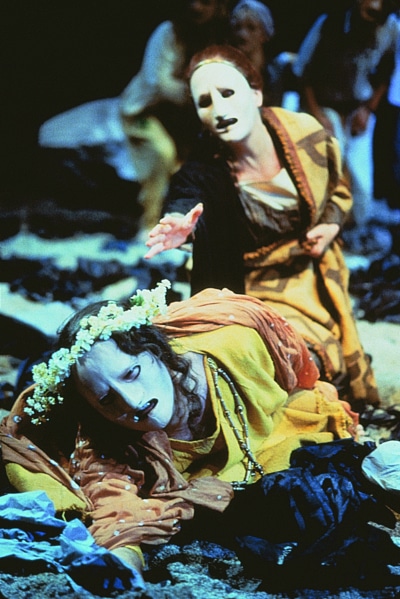
‘Tantalus,’ 2000.
And, of course, they remember Tantalus, the massive, 10-play Trojan War cycle co-production with the Royal Shakespeare Company in 2000 that remains billed to this day as the largest undertaking in theatre history.
“Tantalus was so memorable because it was a real event,” said Merrell. “I was one of the lucky people who saw the entire production in one day. There was such a feeling of community not only among the audience but with the actors. I fondly remember toward the end, after we had sat through an entire day of theatre, when one of the characters said: ‘Tell us a story.’ I guess ultimately that’s what theatre is: Great storytelling.”
Their anecdotes are many. Rich Heinemeyer and Diana Gilmore of Denver were in the audience the 1995 night when The Imaginary Invalid star Randy Moore’s flight from Texas was delayed. So the legendary Tony Church went on in his place. “Basically all Tony had to do was sit in the chair and read because, after all, he’s ‘the imaginary invalid,’ ” remembers castmate Sam Gregory. “About two-thirds into the first act, on comes Randy Moore, dressed fully in character, just like the guy in the chair. So Tony stands up, the two shake hands. Randy sits down in the chair, and my next line is something like, ‘You really don’t seem yourself.’ It was a very Noises Off moment.”
Now mostly well into their 60s and beyond, the charter subscribers regret the gradual end of the resident-company concept. Hiring actors for entire seasons was a practice that has gone out of style at theatres around the country because of the urgent need to tell a wider variety of stories by a wider variety of actors. Still, charter subscribers miss seeing actors they watched mature over decades. “The acting company became my second family,” Merrell said. But at the same time, several subscribers surveyed also said opening the Denver Center’s stages to a larger spectrum of stories and actors over the past decade has infused the theatre being offered here with new and vibrant life.

More than anything, the subscribers say their loyalty belongs to the DCPA Theatre Company itself. And they expressed enthusiasm for this current milestone season under Chris Coleman, who is just the fifth artistic director in the company’s 40-year history.
“I’ve only missed four plays in 40 years,” said subscriber S. Kelly Glenn. “And not because I didn’t like the plays – because I wrote down the wrong dates on my calendar! I will always renew my subscription because the DCPA Theatre Company has become a part of my life. I love their courage in selecting controversial subjects and broadening our perspective on what’s possible in theater.”
Forty years later, the DCPA Theatre Company is now closing in on 5,000 annual subscribers, and the days of sparse attendance are long over. The company sold just shy of 135,000 tickets for the 2017-18 season, more than double the company’s first full season in 1980-81. And that $10 inaugural subscription in 1979 now goes for between $175 and $375.
But every charter subscriber surveyed said they will remain subscribers for life. Why?
Because the Theatre Company represents a substantive companion to touring musicals, one said. The range of stories and storytelling voices, suggested another. The commitment to new voices, added a third.
But perhaps Janowski said it best:
“It’s because I trust you.”
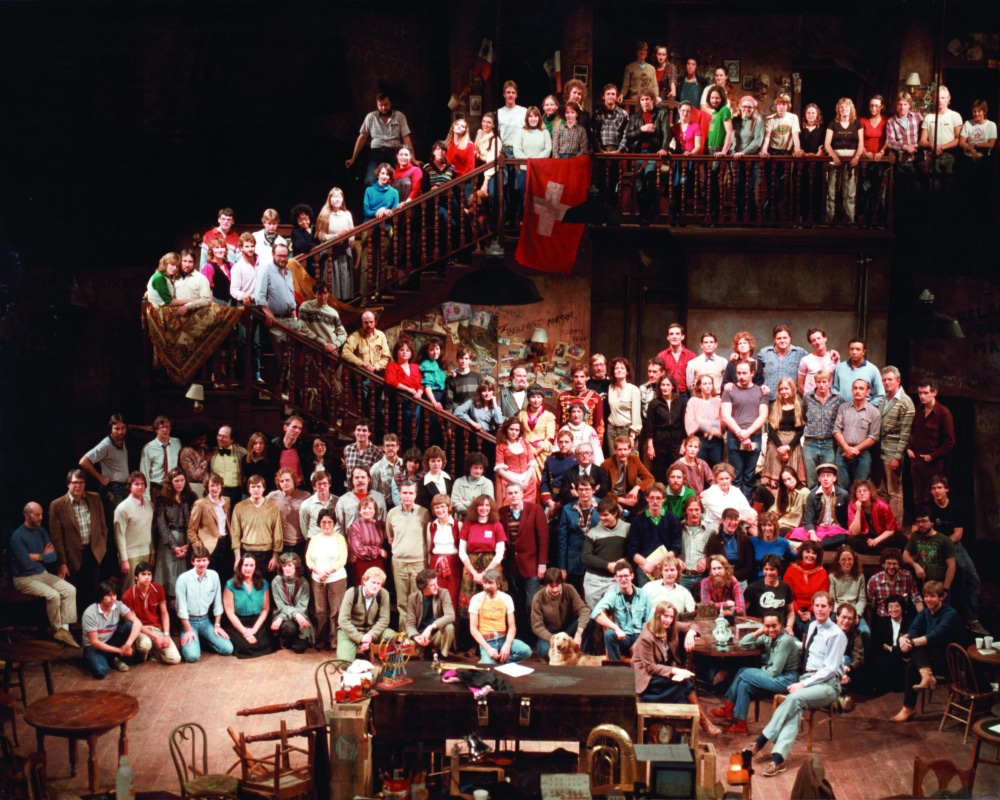
The inaugural DCTC resident acting company in 1979.
Before the DCPA Theatre Company’s milestone 40th season began, we asked original and ongoing subscribers a series of questions, and have summarized their responses below:
Do you have a favorite DCPA performance from someone who went on to be a star?
“Mercedes Ruehl in Medea. Her performance made me fall in love with Greek theatre. It also made me realize the power, beauty and strength of this character. – Christopher H. Merrell, Denver
“Mercedes Ruehl was wonderful in every production she did here. She had an amazing energy and presence that captured the audience.” – Julie Parsons, Denver
“I liked Annette Bening’s performance in Pygmalion. I was excited to see her later as a major Hollywood star. We often talked about how we had seen her when.” – Herb and Arlene Galchinsky, Englewood

Kathleen Brady in ‘The Beauty Queen of Leenane,’ 1999
Tell us of times you saw greatness play out in front of you.
“Kathleen Brady in Martin McDonagh’s Ireland plays. The utter hopelessness of the women she played made me so grateful to be an American woman with opportunities Irish women were denied. The same thing happened in the August Wilson play Fences. The father was a trash collector and he inflicted his failed dreams to play baseball on his son. I chose to see that play twice because the father-son relationship was so painful and it brought up feelings of the pain I have felt about my relationship with my own father. The dignity of his wife, who chose to love her cheating husband’s child, showed that maternal love rises above all. If I only had to choose one play out of 40 years, Fences struck the most powerful chord with me. – Linda Rieger, Denver
“I was emotionally exhausted and disturbed after The Pillowman. That was amazing, unrelenting acting. Wit has stayed with me over the years. The stark white, clinical setting and cool detached unfolding of the story, juxtaposed to the vulnerable, intense, personal feelings and experience of dying.” – Julie Parsons, Denver
“I enjoyed Kim Staunton every time she came on stage, but I was floored when I saw her later in Ruined. Many thanks to her for showing us all how an actor can mature over time.” – Bob Janowski, Denver

Anna Karenina, 2019. Photo by Adams VisCom
What plays are you most excited to see on the 40th anniversary season?
The top three, in order:
Final thoughts?
“It has been a privilege that I cherish to have been able to sit in the dark these past 40 years at the Denver Center. This art form has given me so much: Friendship, leadership, love and direction. And a giant ‘thank you’ to all of the thousands of artists who have been a part of it.” – Christopher H. Merrell, Denver
Click here for more than 450 DCPA Theatre Company photos through the years
